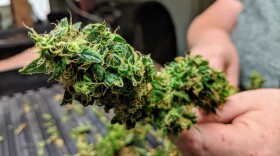Colorado farmers are making history this fall with the first legal commercial hemp harvest on U.S. soil in 57 years. But, the bulk of the harvest won’t be made into the plant’s diverse list of potential uses. Farmers will be squirreling away seed to plant next year reported Nelson Harvey for High Country News.
Shipping hemp seeds across state lines is federally banned. That’s caused a seed shortage which has already stunted the growth of Colorado’s hemp industry. Last spring, farmers registered with the Colorado Department of Agriculture to plant nearly 1,600 acres of hemp. Yet seed shortages, poor germination rates and inexperience with the crop will limit their harvest this fall to about 200 acres, according to Zev Paiss of the Rocky Mountain Hemp Association.
“In an ideal world we’d grow between 1,500 and 2,000 acres of hemp next year, said J.R. Knaub, a 37-year-old farmer in the northeastern Colorado town of Sterling who has been growing corn, sugar beets and alfalfa for the last 20 years and this year planted around 2 acres of hemp. “But getting seed will be the biggest task we have to conquer.”
Industrial hemp believers often call the plant a wonder crop, usable in everything from building materials to batteries to breakfast cereal. With the passage of Amendment 64 in 2012, Colorado hemp advocates have been talking about the possibility as a manufacturing hub for this huge variety of products, but it appears that’s going to take some time.
“Right now we import $580 million per year in hemp products into the U.S.,” said Paiss. “We are talking about tapping into a half-billion dollar industry over the next few years.






